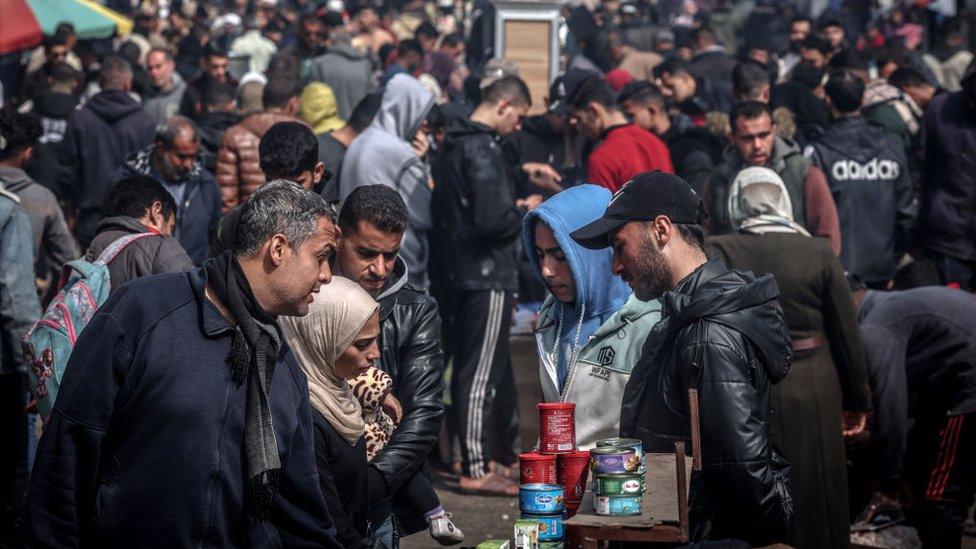Newspaper headlines: Navalny wife blames Putin and US's move to block Rafah offensive
- Published


Rafah is overcrowded with Palestinians who have fled to the southern city from all parts of the Gaza Strip
The Guardian, external highlights what it describes as the "defiant call" issued to Russians by Alexei Navalny's widow in a video message on Monday. It says Yulia Navalnaya's voice trembled with emotion as she vowed to continue her late husband's political work and urged Russians to rally around her. The Times, external reports that she directly accused President Putin of killing Mr Navalny - and said she believed the authorities were deliberately hiding his body to wait for traces of the nerve agent, novichok, to disappear. But suggestions that Mr Navalny's death will finally make Mr Putin an international pariah are dismissed by The Financial Times, external - which points out that the world's three largest democracies, India, the US and Indonesia, could all elect admirers of the Russian president as their leaders this year.
US fears about Israel's planned offensive in Rafah are the main news for The Telegraph, external - which features President Biden's push for a United Nations vote on a temporary ceasefire "as soon as practicable" to halt the fighting in Gaza.
The Mirror, external says the Prince of Wales is planning to raise awareness of the war's human suffering, by meeting aid workers and visiting a synagogue. The Express, external notes that Prince William is honouring his pledge to make peace in the Middle East his "lifelong project" - and says that, like his father and mother, the future King is "showing huge ambition in his choice of duties".
The Mail, external claims to have identified a "major new immigration scandal" - after the outgoing Independent Chief Inspector of Borders and Immigration, David Neal, revealed that Border Force officers failed to check the occupants of hundreds of private jets that landed at London City airport last year. The paper says the "debacle" means gangsters, illegal immigrants and even extremists may have entered the UK "without even rudimentary scrutiny". The Home Office says there was a "recording issue" with the figures given to Mr Neal - making them "misleading". Officials have insisted they will "never compromise" on delivering a safe and secure border.
The Sun, external isn't impressed by the government's efforts to ban mobile phones in schools in England - labelling Monday's announcement a "phoney war". It suggests the plans would have more clout if ministers were laying down the law, instead of issuing guidance which can be ignored. "It all smacks of a ruse drummed up to distract from failings on other issues", the paper says. The Times is more sympathetic, arguing that a ban on phones in schools is an "urgently needed step". But it warns that the new guidance "does nothing to tackle the graver matter of regulating children's use of social media itself".
Two separate studies - noting differences between men and women - feature on the front pages of different papers. The Times, external highlights research which suggests that men need to spend twice as long exercising as women to get the same long-term benefits, including a reduced risk of early death from heart attacks. The Telegraph, external says scientists at Stamford University have proved for the first time that the brains of men and women work differently, after a computer model was able to tell the sexes apart by looking at MRI scans of brains and identifying subtle differences in "hotspot" areas.

Sign up for our morning newsletter and get BBC News in your inbox.
